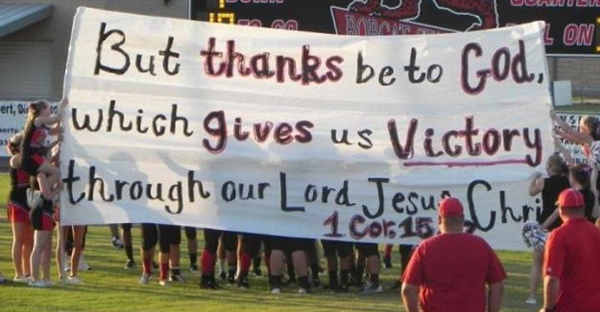You’ve probably seen it by now: The case of Shelly Fitzgerald has attracted a ton of attention. She is a counselor at a Catholic school in Indiana, under pressure to resign due to her same-sex marriage. Some critics have suggested that the case demonstrates the essential bigotry of religious schools. But that’s not how religious schools have ever worked. Instead, this case shows the eternally contested nature of religious schools.
Here’s what we know: Ms. Fitzgerald has worked at her Catholic high school for fifteen years. She has been in a same-sex marriage for twenty-two years. An anonymous activist outed her to the school administration and archdiocese. As a result, Fitzgerald has been asked to resign or separate from her partner. Alumni, meanwhile, are protesting in her favor.
What can this episode tell us about the nature of religious schools? It’s not what my friend the Friendly Atheist thinks. As Hemant Mehta noted, this sort of anti-gay policy should not come as any surprise. It is literally written in the contract signed by employees. As Mehta argued recently,
don’t get mad at the school for being run by bigots. Blame the Church for its rules and blame the parents for sending their kids here. Hell, blame Fitzgerald for taking a job with them when she should’ve known this day would come.
SAGLRROILYBYGTH might agree that such blanket denunciations are simplistic, perhaps willfully so. As I argued in my recent book about evangelical higher education, religious schools have NEVER operated as simple outlets for orthodoxy. Instead, they have served as forums where adherents of a religion hash out what they really care about in terms of God, politics, and culture.
Consider a few recent examples.
At Gordon College near Boston, the president ignited a local firestorm. How? By reminding Gordonians and the public about Gordon’s long-established rules and policies concerning same-sex relationships. President Lindsay did not make up any new rules. He didn’t fire anyone or punish anyone. But even by simply publicly noting the institution’s rules, Lindsay caused a furor among students, neighbors, and alumni.
Or consider the case of Wheaton College’s conspicuous not-firing of Larycia Hawkins. Professor Hawkins came under fire for publicly sporting hijab and writing that Christians, Muslims, and Jews all worshipped the same God. She didn’t break any rules, but she was still forced out.
What’s our takeaway? In religious schools the rules are not the rules. They are one weapon that partisans of different visions can use to change practice at their institutions.
The rules at any religious school are not etched in stone. Rather, in every case, the rules are a negotiation, a guess, a political statement, an aspiration. If you want to understand a religion, don’t look only at statements of faith or official policies. Instead, put in the time to understand how students, teachers, administrators, and church leaders view their schools.














